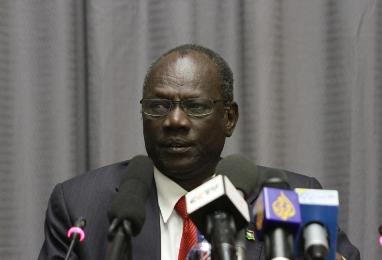South Sudan defends expulsion of peace monitor
April 28, 2016 (JUBA) – The Government of South Sudanese on Thursday came out to defend the decision it made to expel a British national at the secretariat Joint Monitoring and Evaluation Commission (JMEC), accusing the victim of arrogance, subjective and being disrespectful towards government officials at various meetings and engagements related to discussions on implementation of the peace agreement.

Information minister Michael Makuei Lueth, in a letter to his internal affairs counterpart, Acuil Tito Madut, requested that Aly Verjee, a British citizen, be expelled.
Authorities agreed to declare Verjee ‘persona non grata’ from the country last week.
“I, Gen. Acuil Tito Madut, Acting Minister of Interior & Wildlife Conservation, do hereby declare Mr. Aly Varjee Personna Non grata and must be deported within first available flight out of South Sudan within 24 hours ,” partly reads the ministerial order.
The order, dated 11 April, 2016, which was not implemented until 21 April, when government operatives attempted to arrest Verjee after attending meeting of the Joint Monitoring and Evaluation Commission (JMEC) board in Juba.
The manner in which government operatives acted compelled foreign diplomats to object to attempt to kidnap their colleagues in their presence.
The reaction of foreign diplomats, including the head of Joint Monitoring and Evaluation commission, frustrated the attempts to arrest with the intention to deport Verjee, who later decided on 25 April to leave the country in fear of his safety, just a day ahead the return of the leader of armed opposition, Riek Machar, to the country to take his new position as the first vice president on April 26, 2016.
The exact motive behind the expulsion remains unclear, though observers stress that the intention of the government, specifically the interest of the minister of information and broadcasting is to frustrate the efforts of JMEC in highlighting and pointing where each of the parties to the agreement goes out of the parameters within which they should operate and comply with the implementation matrix in accordance with the implementation schedules of the deal.
A letter written by the Inspector General of police, Gen. Makur Marol Aduot, however, revealed the authorities acted on advice of the minister of information to expel British national, Verjee.
“The National Aliens Committee (NAC) deliberated on the note presented by the Government of South Sudan Spokesperson and unanimously considered Aly Varjee as persona non grata that deserves deportation under Section 27 (a) of the Nationality, Passports and Immigration Act”, said Aduot.
The letter cited two different reasons for expulsion. The first reason being the request of the government which sought the secretariat of Joint Monitoring and Evaluation Commission to “be purely South Sudan Nationals but which was not approved by the partners. This request implies that foreign nationals would have been employed by the secretariat at inception and many foreign nationals would have been affected, including those who have remained still serving the monitoring body.
The second reason, according to the letter, alleges that the presence of Varjee would be detrimental to the security of the country without clearly explaining how it would be.
“This British citizen is believed to be doing some dubious business which can affect the security of South Sudan,” further stressed the letter.
The information minister was quoted describing Verjee as an “intruder” and for this reason he and those with whom he share the views about the Varjee don’t want him to continue working with the JMEC secretariat because he has been working at the secretariat of Intergovernmental Authority on Development (IGAD) in Addis Ababa.
“We need new people who can respect South Sudanese,”Lueth told the Nile publication.
(ST)
